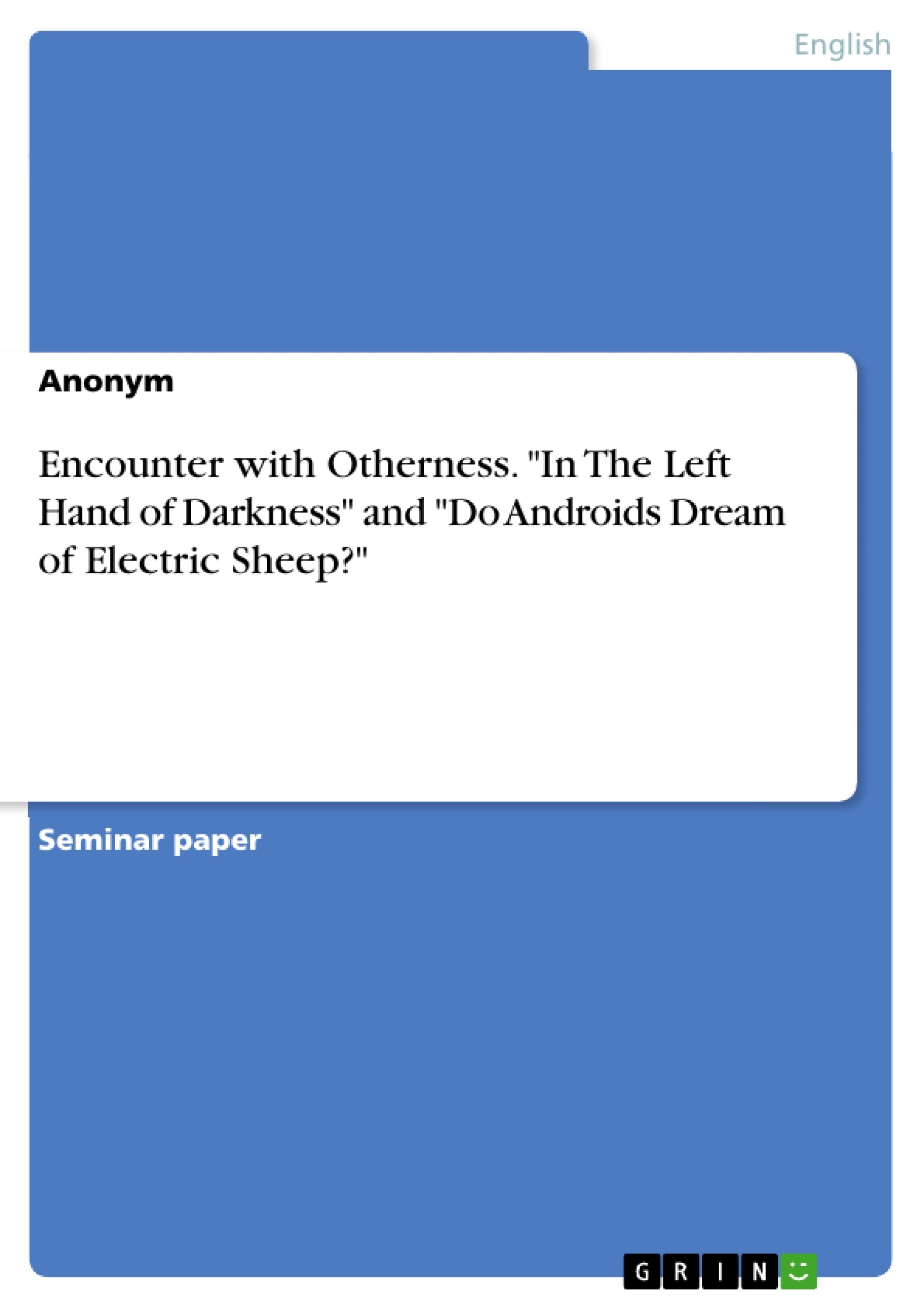This project work will discuss the thesis statement that both protagonists change their view on otherness throughout the story due to individual experience; however, though there are similarities, one protagonist seems to completely accept otherness whereas the other only attempts to accept it. Both develop at least sexual feelings for another species, leading to a broader understanding of diversity. Through the stories social criticism, including racism and homophobia, is addressed.
Numerous science fiction novels discuss the idea of two or more different species that experience encounters with each other. Through this separation of ordinariness and otherness, humans establish boundaries in their minds. To accept otherness and regard other groups as equal, those boundaries must be crossed. In Le Guin's novel The Left Hand of Darkness, the protagonist Genly Ai is sent to the planet Gethen to convince the inhabitants of the planet to join the trade network Ekumen. Genly is human whereas the Gethenians are characterised as aliens. The main character of Do Androids Dream of Electric Sheep? is human as well, and encounters androids almost indistinguishable to humans. The novel is set on earth though most humans had to leave the planet due to the devastation of war. Therefore, both novels involve the encounter of two diverse groups and consequently consider otherness in science fiction.
Inhaltsverzeichnis (Table of Contents)
- Introduction to Otherness
- Otherness in Science Fiction
- Human Encounters with Aliens and Androids in The Left Hand of Darkness and Do Androids Dream of Electric Sheep?
- Aspects of Otherness - An Affection for Androids and Aliens?
- Change of View - Accepting Otherness and Diversity.
- The Protagonists' Development Applied to Social Criticism
- Conclusion
Zielsetzung und Themenschwerpunkte (Objectives and Key Themes)
This project work aims to explore the theme of otherness in science fiction, specifically examining how the protagonists in The Left Hand of Darkness and Do Androids Dream of Electric Sheep? encounter and ultimately change their views on otherness. The work will investigate the relationship between the protagonists and other species, analyzing how these encounters impact their perspectives and attitudes toward diversity.
- Encountering otherness in science fiction novels
- The role of individual experience in shaping attitudes toward otherness
- The acceptance and rejection of otherness through the protagonists' development
- The potential for love and intimacy between different species
- Using the protagonists' experiences to reflect on social issues like racism and homophobia
Zusammenfassung der Kapitel (Chapter Summaries)
The first chapter introduces the concept of otherness and its significance in science fiction. The chapter analyzes how humans define themselves through differentiation from others and how the fear of otherness can lead to prejudice and discrimination. The second chapter dives deeper into the concept of otherness within the genre of science fiction, connecting it to postcolonialism, gender, and sexuality. The chapter explores how science fiction novels often examine the consequences of encountering "alien" or "other" races, prompting readers to question societal norms and consider alternative perspectives.
The third chapter delves into the protagonists' experiences in The Left Hand of Darkness and Do Androids Dream of Electric Sheep?, exploring how both protagonists encounter otherness and develop their understanding of diversity. The chapter examines the protagonist's potential for love and intimacy with other species and how these relationships contribute to their acceptance or rejection of otherness.
Schlüsselwörter (Keywords)
Otherness, science fiction, aliens, androids, The Left Hand of Darkness, Do Androids Dream of Electric Sheep?, diversity, acceptance, prejudice, postcolonialism, gender, sexuality, social criticism.
Frequently Asked Questions
Which novels are compared in this science fiction study?
The study compares Ursula K. Le Guin's 'The Left Hand of Darkness' and Philip K. Dick's 'Do Androids Dream of Electric Sheep?'.
What is the central theme of the project?
The central theme is the encounter with 'otherness' and how protagonists change their views on diversity through individual experience.
How do the protagonists change regarding otherness?
Both develop feelings for another species, but one fully accepts otherness while the other only attempts to do so.
What social criticisms are addressed in the analysis?
The work addresses social issues such as racism and homophobia through the lens of science fiction encounters.
What is the role of gender and sexuality in these novels?
The analysis explores how the encounter with aliens (Gethenians) and androids challenges traditional concepts of gender and human boundaries.
- Quote paper
- Anonym (Author), 2021, Encounter with Otherness. "In The Left Hand of Darkness" and "Do Androids Dream of Electric Sheep?", Munich, GRIN Verlag, https://www.grin.com/document/1338614



